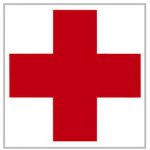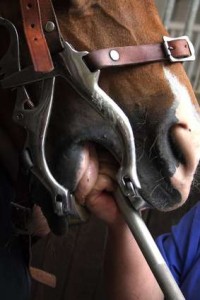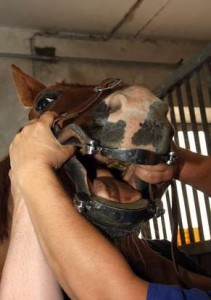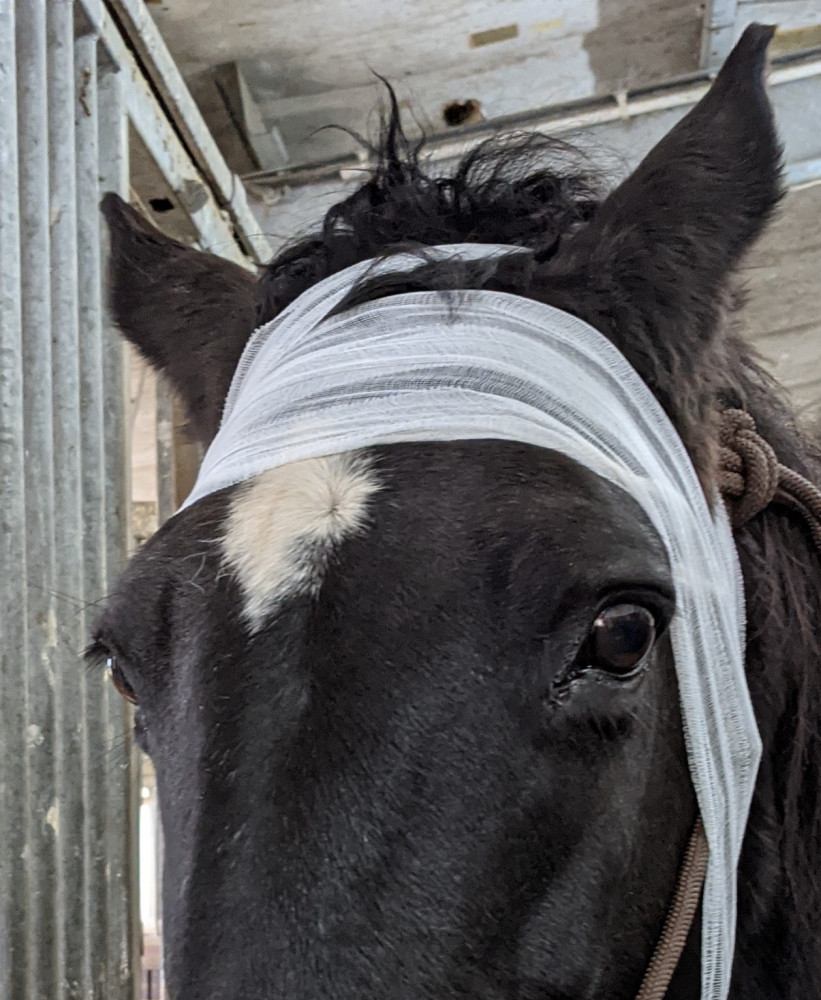Horses with toothache
 Before the present time of domestication horses lived in the steppe and ate grass all day long. The teeth had an important and strong use because they had to scrunch the silicate of the grass.
Before the present time of domestication horses lived in the steppe and ate grass all day long. The teeth had an important and strong use because they had to scrunch the silicate of the grass.
Nowadays the living conditions for the horses have changed and now many horses have an acute toothache.
Origins for horses with dental problems
In the course of the last decades the fodder and living conditions for horses have changed- but the teeth did not. Today we feed horses with soft hay, silage and pellets. For chewing these kinds of fodder horses do not use all parts of their teeth. This causes an irregular wear of the teeth and therefore an acute toothache. A further problem is the different consistency of the grass. Today the concentration of silicate is less so that also the teeth become less grinded.
Molars
Every year a tooth grows 2-3 mm out of the alveolus. The problem is that the molars become grinded in an irregular way what causes sharp edges. Especially the first and last molar often offers these kinds of notches. In other cases the teeth become too long and the denture cannot close correctly. This causes great difficulties for the chewing. In the worst there is a painful strain of the temporomandibular joint and a blockage of the chewing mechanism. Additional the sharp edges can damage the tongue or the mucous of the cheek what can be the origin for bleedings or inflammations.
Incisors
In opposite to the molars the incisors do not become warn grinded enough so that they grow in an unhindered way. This causes a great pressure on the opposite teeth. If the pressure becomes too high the teeth cannot stand it and tip to the side. Old horses often have stress symptoms and periodontosis near the gum of the incisors.
Young horses with toothache
Young horses have a dentition between their second and fifth year of age. Some areas do not reject their milk tooth cap so that the new tooth cannot grow on a straight way out of the gum. Instead they try to find a different way to grow out of the jaw. This causes striking deformities of the teeth and attritions of the bones in the jaw. Both are origins for painful inflammations. A symptom for this kind of deformity can be purulent discharge out of the mouth of the horse. For the opposite tooth (antagonist) however there are no limitations anymore so that it can grow and become longer than all the other teeth in his row. Through this there are waves and steps what makes it really difficult for the horse to crush the fodder in an optimal way.
Wolf tooth
If you inform yourself about the teeth of the horse you often hear about the so called wolf teeth. Only horses have them and they are positioned in front of the molars. In the course of the evolution these teeth became smaller and smaller and today only some horses offer them. Generally they are less rooted than all of the other teeth. Horses with wolf teeth have great pain because these teeth exactly knock on the snaffle bit. Due to the short roots however an extraction is really easy.
Symptoms
The intensity of the pain depends on the horse. Referring to this the symptoms cannot be categorized and it is important that the horse owner is really observant. Sometimes the horse has problems while chewing so that the fodder falls out of the mouth. Further symptoms are an extreme outflow of the saliva while eating, undigested nutrients in the feces, blood in the mouth or a rotten smell. Horses with toothache are really sensitive in the whole area of head and mouth and sometimes it can be impossible to bit them. While riding the horse shakes his head up and down because he tries to get rid of the snaffle bit. Every day horse owners need to use the time of grooming to inspect the horse. Small swellings at the head can be an indicator for toothache. If horses completely reject any kind of fodder there can be plenty possible origins. However for the diagnosis you also always need to think about possible toothache.
Prevention

 Animal Welfare always is really important for the health of the horse and also guarantees the prevention of toothache. Horses which have the possibility to go out on the pasture do not only eat grass but also ingest dirt and tiny stones. These are important for the regulation of the length of the teeth and grind them in a natural way. To get the same effects for stable horses you need to feed an additional portion of roughage.
Animal Welfare always is really important for the health of the horse and also guarantees the prevention of toothache. Horses which have the possibility to go out on the pasture do not only eat grass but also ingest dirt and tiny stones. These are important for the regulation of the length of the teeth and grind them in a natural way. To get the same effects for stable horses you need to feed an additional portion of roughage.
The teeth of the horse need to be controlled regularly
The teeth of the horse need to be controlled regularly by a professional vet (at least once a year but experts advice every 6 months).
The vet can rasp the teeth of the horse what prevents any kinds of deformity.
Surf tips:
- Calcium, Potassium and Co – All information about Electrolytes
- How to minimize the risk of laminitis
- Stable vices of horses: Weaving
- The perfect feed for your horse in the winter period
—All statements without guarantee—

5 Comments
Comments are closed.